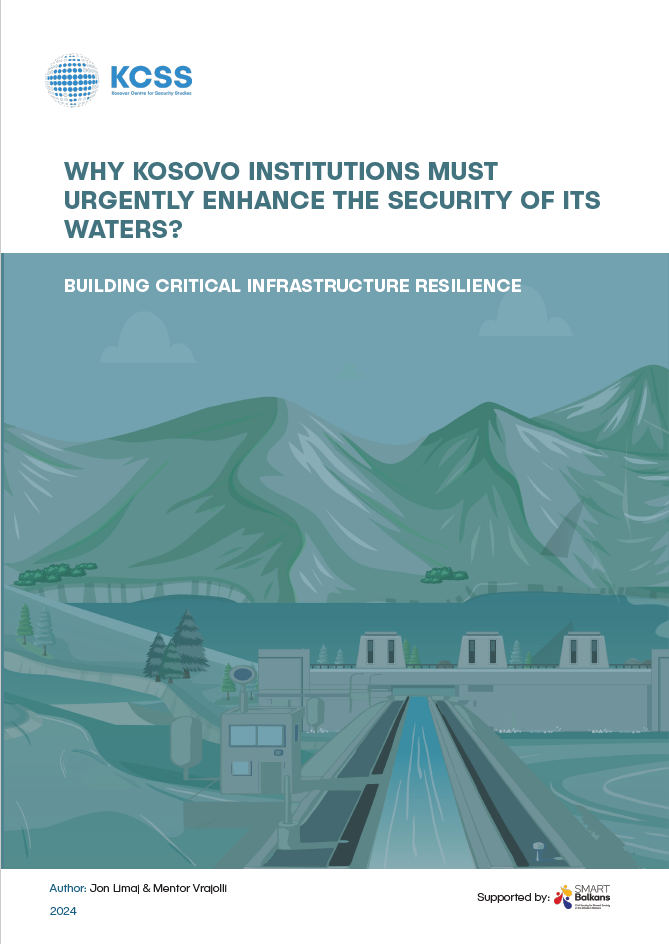24/12/2024

Kosovar Centre for Security Studies (KCSS)
SMART Balkans
Jon Limaj, Mentor Vrajolli
In recent years, threats to critical infrastructure have increased. This is primarily due to growing global threats and the digitalization of key operational processes, including those in the water sector. Consequently, the Government of Kosovo, in collaboration with relevant stakeholders, has placed significant emphasis on ensuring resilience in this sector. While Kosovo has legislative frameworks in place on protecting critical infrastructure, including the Water Law and Law on Critical Infrastructure, there are gaps in implementation. Furthermore, there is a lack of full alignment with the EU Water Framework Directive. Comprehensive integration and legislative amendments are necessary for effective water management.
As regards the Law on Critical Infrastructure, the main caveats in its implementation currently derive from Kosovo’s Ministry of Internal Affairs (MIA) delays in establishing responsible enforcement mechanisms. In parallel to the infancy of establishing the mechanisms, there was a need to amend the existing legislation to align it with the newest legislation of the EU in place. Reportedly, the current draft law that has been circulated does not clearly define the critical infrastructure sector. The water sector is not under the critical infrastructure law alone. Rather, it is also subject to the Law on Waters of Kosovo that provides details on how the water resources are managed, protected and used. It specifies the duties of various institutions, such as the Ministry of Environment and Spatial Planning, in the management and protection of water resources. But as with the critical infrastructure law, the Law on Waters is unable to comply fully with EU rules, especially in terms of integrated water management and environment protection.
Overall, Kosovo’s water infrastructure encompasses water supply systems, treatment facilities, distribution networks, and flood management structures. Due to its geographical characteristics, Kosovo is highly susceptible to water resource scarcity. Despite some modernization efforts, much of the infrastructure remains outdated, and the country faces considerable challenges from urbanization, agricultural demands, and climate change. Recent investments in this sector have primarily focused on the maintenance and upgrading of existing water capacities. However, no significant strategic investments aimed at enhancing water resilience have been made over the past decades. Water infrastructure governance is fragmented, and lacks proper coordination mechanisms, which hampers the implementation off effective and coordinated actions to address sector challenges.
Climate change does seem to have impacted its weather significantly, manifested by prolonged dry seasons followed by rapid heavy rains causing heavy flooding and exposing the limited capacities of the water canalization systems. Water pollution too remains, and water quality continues to persist a major challenge that this sector faces. The threat from intentional acts targeting critical infrastructure in Kosovo, including sabotage or other malicious activities, is on the rise. However, incidents
like the Iber Lepenc attack may not be classified as acts of international terrorism but rather as localized or politically motivated actions. The recent attack involving explosives against the Ibër-Lepenc Water Channels in November 2024, similar to the Banjska incident in September 2023, has raised questions about the possible involvement of Serbia. These allegations were highlighted by Kosovo’s Ministry of Internal Affairs, which stated that evidence points to cross-border influences. The American Embassy in Kosovo publicly condemned these attacks, underscoring the gravity of the threats to critical infrastructure. Notably, the group responsible for the Banjska attack is known to operate within Serbian territory, its notorious principal terrorist Milan Radoicic moves freely in Belgrade and keeps strong links with Serbian President Vucic as well as the SNS ruling political party. In this context, Serbia’s potential involvement may include either direct support or facilitation of actions targeting Kosovo infrastructure by entities operating within its borders.
This situation raises concerns about the emergence of state-sponsored terrorism that may impact not only Kosovo but also the Western Balkans. Such continued behaviour could pose significant risks not only to essential infrastructure but to regional peace itself. Russia’s influence in the region fosters instability, using disinformation and pressure to deepen local tensions. It could escalate from disrupting stability to enabling extremist groups, aiming to block the region’s integration with the West. At the same time, critical infrastructure remains vulnerable to terrorist attacks, including those driven by religious motives, compounded by the lack of a clear strategy to protect it.
The critical infrastructure in Kosovo requires immediate actions as follows:
Urgent update and implementation of the new Law on Critical Infrastructure;
Adjusting and tailoring national strategies and safety protocols with respect to critical infrastructure;
Further alignment of the water legislation with the EU Water Framework Directive;
Upgrading and coherently maintaining the aging infrastructure and expanding wastewater treatment;
Encouraging public-private partnerships and improving water quality control;
Strengthening institutional frameworks and enhancing climate resilience in water management;
Ensure physical safeguarding of the infrastructure, especially in the parts that are considered essential;
Coordinated efforts, increased investment, and international cooperation are essential to ensure sustainable and resilient water infrastructure, supporting Kosovo’s aspirations for EU membership and benefiting its population and environment.
This policy brief is published in the framework of the SMART Balkans project, implemented jointly by the Center for Civil Society Promotion, the Institute for Democracy and Mediation (IDM) and the Center for Research and Policy Making (CRPM), with the support of the Norwegian Ministry of Foreign Affairs.